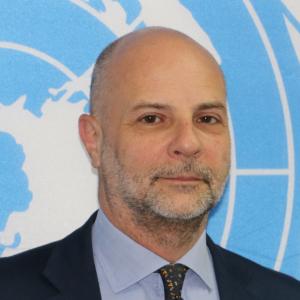Your Excellency, Prime Minister Muhammad Shia al-Sudani,
Your Excellency, Acting Council of Representatives Speaker Mohsen al-Mandalawi,
Your Excellency, Prince Hazem Tahseen Bek,
Survivors and families of the victims of the Yazidi genocide,
Distinguished participants,
Thank you for the invitation to speak at this event.
Let me start by expressing the United Nations’ deep solidarity with all the victims of what has been one of the sickest and most dangerous ideologies in history. Da’esh focused on the Yazidis with particular ferocity, although other components were also targeted, as well as Shia and Sunnis. So many lives were lost, so many unspeakable atrocities were committed, and the crimes committed are still impacting the lives of survivors.
Among the Yazidis, there are still more than 2,600 missing. Mass graves have yet to be excavated. And more than 200,000 Yazidis remain displaced, many still living in camps in the Kurdistan Region. Others have returned, but without sufficient support and services they need to live normal lives.
“This genocide is the latest of many more in our history” some Yazidis have told me, “we cannot look to the future with any hope”.
Ladies and gentlemen,
We need to restore hope in the future. Today we are renewing our commitment to healing the wounds that were opened in August 2014 and laying the foundations for a society in which such atrocities will not be repeated. I welcome the efforts of the government in this regard and I wish to highlight three critical requirements for progressing in this direction.
First, reparations. This is key to assisting survivors in rebuilding their lives. In this context, the adoption of the 2021 Yazidi Survivors’ Law was an important initiative, and I welcome the fact that nearly 2,000 survivors are benefitting from it. But the law should be implemented at greater speed and expanded to all victims, including children born of rape.
Second, returns. In order to ensure safe, voluntary, dignified and inclusive returns, displaced Yazidis need political and administrative stability in Sinjar and elsewhere. They also need security forces they can trust. These conditions are also necessary for reconstruction to pick up pace. This is what will allow people to return and rebuild their homes as well as their lives. This is also the right way to work towards the closure of displacement camps.
Third, justice. Efforts must continue to hold accountable those responsible for the crimes committed by Da’esh, by holding fair trials in Iraq, or in other countries through cooperation with the Iraqi judiciary. Trials are also important to identify the individual perpetrators, thus avoiding an entire community from being blamed. And just as we pursue those responsible for atrocities, we should recognize those who took risks to protect their Yazidi neighbours.
Ladies and gentlemen,
Allow me a final word on the role of the United Nations. Next month, UNITAD will end its mission in Iraq. We appreciate their work in investigating the crimes committed by Da’esh members, and look forward to the work of UNITAD being continued by Iraqi institutions, the Council of Representatives and the judiciary. At the end of next year, UNAMI too will conclude its mission in Iraq. However, the United Nations Country Team will remain and continue to work with the Iraqi government, state institutions and civil society in fighting extremism and supporting its survivors.
In conclusion, let us remind ourselves that Da’esh, while largely defeated, is still a serious threat in Iraq and globally. Regrettably, other forms of extremism and intolerance are widespread across the world.
Here in Iraq we all have a responsibility to work in building a society in which diversity is a source of richness, not a threat. What is at stake is not only the future of the Yazidi community in Iraq, but also the future of Iraq as a pluralistic country in which the human rights of everyone are respected.
On this tenth anniversary, let us recommit ourselves to this goal.
Thank you.


